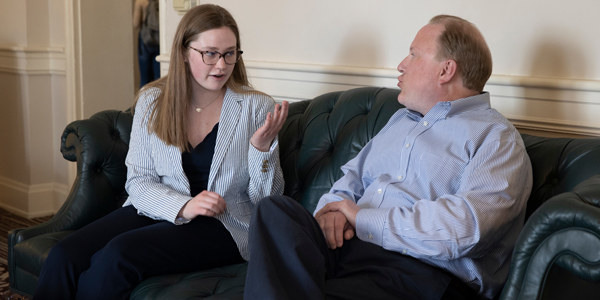Truman Scholarship winner works to improve voter access
Senior Cameron Tiefenthaler held internship in Washington, D.C., and abroad

Truman Scholarship winner works to improve voter access
Truman Scholarship winner Cameron Tiefenthaler, a senior with a double major in Political Science and Business Analytics, believes it’s important to limit possible issues and barriers so that all potential voters can make an impact on their government.
Her interest in voter access led her to pursue internships at the U.S. Election Assistance Commission in Washington, D.C.; with IGNITE, a nonpartisan, nonprofit organization that helps support women as they run for office; a campaign fundraising firm in D.C.; and with the U.S. Embassy in Luxembourg while she studied abroad at the Miami University John E. Dolibois European Center.
In order to receive the Truman Scholarship, a student must be selected by their college or university. They must also plan to attend graduate school and pursue a career in public service.
We interviewed Tiefenthaler about her experiences:
What is the Truman Scholarship and why is it important?
The Truman Scholarship is special because it helps to further propel people interested in public service, in whatever capacity, to help achieve their graduate school goals and ensure that they are better educated to be a better public servant. It exists for the purpose of identifying the nation's next great public servants. Additionally, it is the nation’s living memorial to former President Truman.
How long have you been interested in improving voter participation and in what ways have you attempted to increase it at Miami?
I’ve always been really interested in voting, ensuring that people who are eligible to vote and want to vote are actually able to vote. I’ve done a ton of work on Miami’s campus to promote civic engagement. In terms of my efforts to engage all students in the process, I focused on those who vote at the lowest rates on campus and worked to equip them with the resources necessary to feel educated about elections.
Noticing gaps and inefficiencies in how Miami addresses voting led me to lay the foundation for a civic engagement coalition where we could bring together all of the groups on campus that work to increase voter turnout and have round table discussions on how to improve. Before I left for my study abroad program last spring, I brainstormed what institutional barriers students still face, like not knowing about voting deadlines and polling locations, not feeling educated enough about candidates and issues, a lack of using a Miami ID to vote, not receiving absentee ballots due to slow campus mail, and more.
Tell us more about your role as the secretary of governmental relations in Miami’s Associated Student Government.
This school year (2022-2023), as the secretary of governmental relations in Miami’s Associated Student Government (ASG), I co-led the civic engagement coalition with Annabel DeChant in the Wilks Institute for Leadership and Service. I had discussions about the new Ohio Voter ID law, which restricts the forms of valid ID necessary to vote; reflected on the 2022 general election; brainstormed how to advocate for civic engagement with being involved in community success overall; and discussed the potential of having Election Day as an academic holiday.
These group discussions took place between Wilks, ASG, ASPIRE, the Menard Center for Democracy, and various departmental representatives. Besides the coalition, we worked with Wilks to register voters, and one of my senators led a voter registration drive in the fall in CSDI (Center for Student Diversity and Inclusion) to ensure voting resources and information reached students of marginalized backgrounds. One of the things I’m proud of is my work on campus to ensure our approach to civic engagement is more intersectional.
Why should students vote during the upcoming special election?I’ve spent a lot of time working in and around politics. So, I feel very passionately that each person who wants to have a say in our government and democracy should. It is for and by the people.